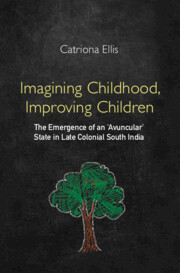 Imagining Childhood, Improving Children
Imagining Childhood, Improving Children Book contents
- Frontmatter
- Dedication
- Contents
- Acknowledgements
- List of Abbreviations
- Introduction
- 1 The Child at School: Compulsory Education in the Madras Presidency
- 2 Educating the Child: The Introduction of Compulsory Education in Madras City
- 3 Imagining the Child as Learner: Progressive Pedagogy in the Madras Presidency
- 4 Producing the Healthy Schoolchild
- 5 Saving the Child: The Madras Children Act, 1920, and the Beginnings of a Juvenile Justice System
- 6 Protecting the Poor Child: The Practical Expansion of Juvenile Justice
- 7 Defining Childhood: Sexual Parameters of Childhood
- 8 Remembering Childhoods: Childhood Memories in Autobiographies
- Conclusion: Children, Childhood and the Growth of the Avuncular State in South India
- Notes
- Bibliography
- Index
6 - Protecting the Poor Child: The Practical Expansion of Juvenile Justice
Published online by Cambridge University Press: 19 April 2023
- Frontmatter
- Dedication
- Contents
- Acknowledgements
- List of Abbreviations
- Introduction
- 1 The Child at School: Compulsory Education in the Madras Presidency
- 2 Educating the Child: The Introduction of Compulsory Education in Madras City
- 3 Imagining the Child as Learner: Progressive Pedagogy in the Madras Presidency
- 4 Producing the Healthy Schoolchild
- 5 Saving the Child: The Madras Children Act, 1920, and the Beginnings of a Juvenile Justice System
- 6 Protecting the Poor Child: The Practical Expansion of Juvenile Justice
- 7 Defining Childhood: Sexual Parameters of Childhood
- 8 Remembering Childhoods: Childhood Memories in Autobiographies
- Conclusion: Children, Childhood and the Growth of the Avuncular State in South India
- Notes
- Bibliography
- Index
Summary
The passing of the Madras Children Act, 1920 (MCA) demonstrated a new concern for children among legislators, and the development of a consensus regarding children as uniquely vulnerable because of their age, as worthy of investment as future citizens and therefore as the responsibility of the state. Although the act attempted to signal the modernity of the state, the responsibility for the implementation of the act was unclear, with the exception of the government-run certified schools discussed in Chapter 5. This chapter explores the ways in which civil society assumed the responsibility to extend juvenile justice provisions, albeit still in conjunction with state actors such as politicians, officials and salaried magistrates, and how these societies and their members became important contributors to the discourses surrounding childhood and the child in need of care or control. During the 1920s the Madras Children's Aid Society (MCAS) emerged as the most significant child-saving organisation, and this chapter interrogates its position in the public sphere of the Madras Presidency as well as its aims and methods. The second half of the chapter considers the implementation of the MCA in the juvenile court, with an analysis of the space and personnel of the juvenile court system, the probation service and the boys club.
Within the context of juvenile justice, between 1925 and 1940 there was a marked expansion of ‘the social’ as a depoliticised area at the intersection between the state, the family, civil society and expert professionals. This was in contrast to the political sphere, which was characterised by increasingly assertive nationalist attempts to contest both the exercise of power by, and the moral foundations of, the racialised colonial state, often through social questions such as the age of consent (see Chapter 7). While many of the individuals were actively engaged in the anti-colonial movement, the Indianisation of state structures through dyarchy and newly reformulated ideas about philanthropy and civil society encouraged highly educated middle-class Indians to participate in public life based on new notions of social service and civic activism as a form of patriotism, even as these ideas were to some extent a reformulation of previous ideas about religious duty and social reform.
- Type
- Chapter
- Information
- Imagining Childhood, Improving ChildrenThe Emergence of an ‘Avuncular’ State in Late Colonial South India, pp. 153 - 179Publisher: Cambridge University PressPrint publication year: 2023


